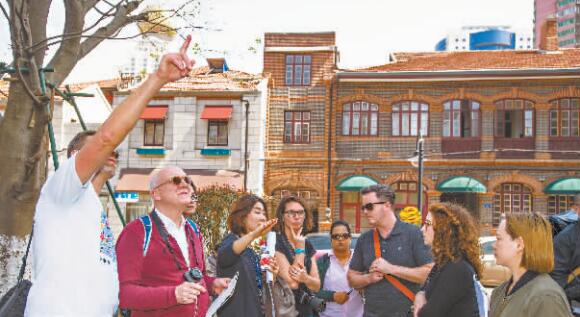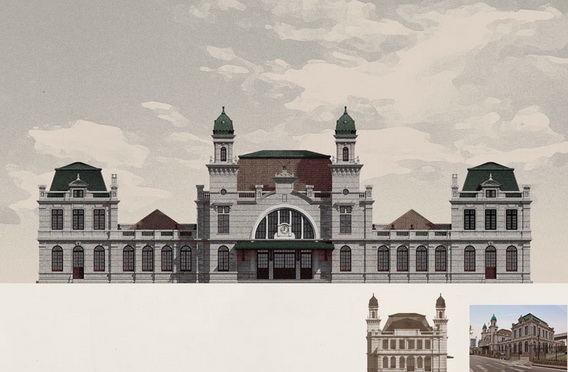Current position: > ENGLISH > What's on > News >
International planning experts visit Wuhan
Release time:2017-08-05 11:39

ISOCARP members walking along Zhongshan Avenue Photo by Hu Jiusi
A team of experts from the International Society of City and Regional Planners (ISOCARP) came to Wuhan on March 31 to offer ideas and suggestions on planning for the city's highlighted key areas.
The panel of renowned experts included Martin Dubbeling, Vice President of Urban Planning Advisory Teams (UPATs) for ISOCARP; Shi Nan, Vice President of ISOCARP; Jacob Modder, Chair of the Dutch Council on Tall Buildings; and Frank D'hondt, an official with the United Nations Human Settlements Programme (UN–Habitat).
The delegation paid a visit to the Wuhan Planning Exhibition Hall, Zhongshan Avenue, and the East Lake Greenway. They said that the keywords for building Wuhan into a world-class city are "openness" and "green," and they hoped to see a film about Wuhan in a New York theater in the future.
University students are the city's most valuable asset
Jacob Modder said that during his week-long visit, he has been to Lihuangpi Road three times for coffee and has enjoyed the atmosphere of this street museum. "It's an open space, a walking street, and a green environment where people can have a relaxing time and experience the convenience the city brings."
He believes that Wuhan has what it takes to become a world-class city, especially when it comes to resources. He explained, "Wuhan is the biggest city in Central China. It's a cultural city with a very long history and abundant natural resources. Its advantageous location makes it a transportation hub. Most importantly, 10 percent of the population is made up of university students. This is Wuhan's most valuable asset."
Shi Nan agreed that Wuhan should take full advantage of this talent pool and encourage young people to be more involved in the city's planning and construction.
Building cycling routes along Changjiang Axis is a good idea
Wuhan is planning to build greenways along the Yangtze River (Changjiang), and a bicycle highway system along the Changjiang Axis. Martin Dubbeling feels they are both good ideas.
Dubbeling said that during this investigative trip he has seen cycleways being constructed in the city. "It seemed that there was no room for cycleways in some places, but really it's just a matter of prioritizing the flow of traffic by using the rules of right of way. Road priorities need to be reset in order to improve and develop the slow mode transportation system."
Fotenn consultant Michael Stott spoke highly of the bicycle-sharing service Mobike brings to Wuhan. He said that he was very impressed with the sharing economy model. "Emerging new ideas like this should also be taken into consideration in city planning."
Wuhan should promote "soft power"
"When people think of Paris, images of French literature and films will flash into their minds. When people think of New York, they think of singers and movie stars. This is known as a city's cultural soft power," said Jacob Modder.
He suggested that Wuhan should promote its soft power and make itself known to people all over the world. "For example, it'd be great if one day an American audience could watch a film about Wuhan in a New York theater." He said, "The local government is making a lot of effort to attract more international performances and sporting events to Wuhan and making it into a city with global influence, which is also a great idea."
Frank D'hondt explained that an open city means a city that embraces diversity. "More links should be set up between big projects and small communities, turning community areas into open spaces."
|
That may be of interest to the article
- Ruopu CITY1000 Creative Projects
- Wuhan Design Biennale
- Wuhan Fashion Week 2018
- Great Rivers Forum
- Engineering Survey and Design Institute Dir
- Wuhan Night held in Beijing Design Week
- Message from Ms Irina Bokova on the Interna
- China's Dinosaur Egg Museum Blends the Anci
- Wuhan: Construct "Five Cultural Cities"
- 2016 Work Report of Wuhan Municipal Governm
- Regulations of Wuhan Municipality on Protec
- The WeChat Official Account of Wuhan Planni
- Wuhan Sets Up a Cultural Enterprise Credit
- Wuhan’s New 30 Articles Provides that At
- Wuhan Industrial Design Development Fund Pr
- Report on the Work of the Government and Po

